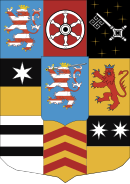
Back ماريا ألكسندروفنا Arabic Mariya Aleksandrovna (Rusiya imperatriçası) Azerbaijani Марыя Аляксандраўна (імператрыца) Byelorussian Мария Александровна Bulgarian Marie von Hessen-Darmstadt Breton Maria de Hessen-Darmstadt Catalan Marie Alexandrovna Czech Marie af Hessen og ved Rhinen Danish Marie von Hessen-Darmstadt German Μαρία Αλεξάντροβνα (Μαρία της Έσσης) Greek
| Maria Alexandrovna | |||||
|---|---|---|---|---|---|
 Portrait by Franz Xaver Winterhalter, 1857 | |||||
| Empress consort of Russia | |||||
| Tenure | 2 March 1855 – 3 June 1880 | ||||
| Coronation | 7 September 1855 | ||||
| Born | Princess Wilhelmine Marie of Hesse and by Rhine 8 August 1824 Darmstadt, Grand Duchy of Hesse, German Confederation | ||||
| Died | 3 June 1880 (aged 55) Winter Palace, St. Petersburg, Russian Empire | ||||
| Burial | Peter and Paul Cathedral, St. Petersburg, Russian Empire | ||||
| Spouse | |||||
| Issue | |||||
| |||||
| House | Hesse-Darmstadt | ||||
| Father | Louis II, Grand Duke of Hesse (officially) August von Senarclens de Grancy (rumored) | ||||
| Mother | Princess Wilhelmine of Baden | ||||
| Religion | Russian Orthodox, prev. Lutheran | ||||
| Grand Ducal Family of Hesse and by Rhine |
|---|
 |
| Louis II |
|
Maria Alexandrovna (Russian: Мария Александровна), born Princess Wilhelmine Marie of Hesse and by Rhine (8 August 1824 – 3 June 1880), was Empress of Russia as the first wife of Emperor Alexander II.
The daughter of Ludwig II, Grand Duke of Hesse, and of Princess Wilhelmine of Baden, she was given a good education and raised in relative austerity, with an emphasis on simplicity, piety and domesticity. Her mother died when Marie was only twelve, and when she was fourteen, she caught the eye of Tsesarevich Alexander Nikolaevich, who was visiting her father's court while making his Grand tour of Western Europe. The couple were married after Marie turned sixteen. The new tsesarevna did not initially enjoy court life because of her withdrawn nature, and the fact that she found the splendor and extravagance of the Russian court daunting after the frugality that she was accustomed to. Marie soon grew to identify strongly with her adopted country, and her young age at marriage facilitated this adoption.
After the death of her father-in-law, Nicholas I, in 1855, Alexander became emperor and, now known as Maria, she became empress consort of Russia. After the death of her mother-in-law in 1860, Maria took on a greater role in public life. She became one of the founders of the Russian Red Cross Society, part of the International Red Cross Movement which was founded in 1863 to promote nursing and medical care across the world. She also established Russia's first all-female schools. She gave her husband strong moral support as he navigated the legislations to end serfdom. She also interested herself in the arts: The Mariinsky Theatre in Saint Petersburg and the Mariinskyi Palace were built under her patronage and named after her.
Despite identifying strongly with Russia and Russian interests, she visited her native Hesse regularly every year from the early 1860s onward, and kept in touch with her own family, as also with her husband's relatives across Europe. She suffered from tuberculosis from 1863 onwards and spent long periods of time in southern Europe to avoid the harsh winters of Russia. Her health worsened after the death of her eldest son, Nicholas Alexandrovich, who died just before the date of his intended wedding. She was noted for her wisdom and intellect, and her generous devotion to family, including her husband's mistress and her children.